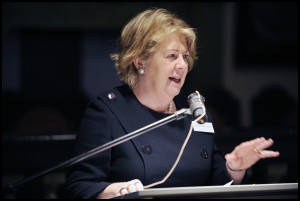A BLOG POST BY BARONESS GOUDIE FROM THE HUFFINGTON POST International Women's Day is an important celebration of the great strides women around the world are making to ensure they are recognised and working towards equality. During the last year we have seen some incredible acts of bravery throughout the Arab world, and globally we have taken some truly inspiring steps to ensure the voices of women are heard and recognised.
International Women's Day is an important celebration of the great strides women around the world are making to ensure they are recognised and working towards equality. During the last year we have seen some incredible acts of bravery throughout the Arab world, and globally we have taken some truly inspiring steps to ensure the voices of women are heard and recognised.
There is however still a long way to go to ensure women enjoy freedom, equality and recognition globally. Women are still discriminated against in the boardroom, excluded from parliamentary decisions, traded as commodities and deprived of even owning their own land.
I have been fortunate enough to work at a global level on the issues of women, through my work in the House of Lords, with Vital Voices, UN Gift, Community Foundation for Northern Ireland and many other organisations dedicated to women and children. This experience has enable me to identify where there has been success in the fight to empower women, but also where there still needs to be much work.
Women in the boardroom
The issue of women in the boardroom was recently addressed by David Cameron, at the Northern Futures Forum summit in Stockholm, Sweden. He suggested that 30% quotas could be the answer to inequalities in Britain's boardrooms. As a steering committee member of the 30% Club, an organisation committed to bringing more women onto UK boards, which is good for the overall effectiveness of boards and therefore good for business. I believe it is a positive step to be focusing on this issue but that quotas are not the answer. Change in the boardroom is not happening fast enough, and the discussion needs to continue to ensure that people begin to be persuaded to the benefits. Since Lord Davies' report into women on boards, in February 2011, the proportion of FTSE 100 women directors has risen from 12.5% to 15% this year. Illustrating that the movement is beginning to happen and overtime we hope to see women playing a substantial role in the success of FTSE100 companies. Enabling this to become a way of life, not an exception.
Women at the peace table
The Arab Springs saw both men and women take to the streets in the Arab world to protest against their country's leaders. In many cases, women were critical actors in these revolutions. Many were bloggers, activists, leaders and logistics experts. In Libya on the 3 September 2011, Martyrs' Square was filled for part of the day with only women to celebrate the fall of Colonel Gaddafi and their role in that battle. The key question now is in each country, how much space will there be for women to participate fully in these nascent democracies.
Research shows that women's participation helps build stronger businesses and public institutions. A study of legislative actions in countries belonging to the Organization of Economic Cooperation and Development (OECD) found that the greater the number of women in a country's parliament, the more they spend on education as a percentage of GDP and per capita. Perhaps even more important however, is the involvement of women wherever decisions are made. This could be when electing women to office at the local or national level or involving women in decision making about how camps are run or resources are distributed.
Since the devastating earthquake in Haiti in 2010, the country has had to deal with many challenges. The group Femmes en Democratie has worked to develop a women's policy platform. Their aim is to expand Haitian women's role in generating economic opportunities, increasing political participation and protecting human rights. Women comprise 52% of Haiti's population, and approximately 44% of households are led by women. Haiti cannot make economic and social progress if it leaves half of its people behind and neglects the diverse experiences, talents and vision of its women. These sorts of initiatives will enable the Haitians to move forward from the earthquake and build a stronger country and economy.
Inspiring hope for the future
International Women's Day is an important celebration of the achievements of women around the world. Everyday women are risking their lives and enduring inconceivable hardship as a result of their gender. We are making incredible advances in equality which was especially illustrated this year with three inspiring women sharing the Nobel Peace Prize; Liberian President Ellen Johnson Sirleaf, women's rights campaigner Leymah Gbowee, also from Liberia, and Tawakkul Karman, a key icon in the protest movement in Yemen. These sorts of recognitions inspire us with hope for the future. Our collective voices can drive action and change, and I encourage each and every one of you to do what you can do to support the world's women to achieve their potential and breakdown the barriers of discrimination.
